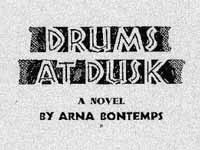
Drums at Dusk |
Drums at Dusk by Arna Bontemps is an imaginary story set in the
Caribbean island of Saint Dominque two years after the Parisian
mobs stormed the Bastille. French sugar plantation owners are
faced with a slave insurrection. While voodoo drums rumble in
the night air, a gathering of blacks plans to burn cane fields
and mansions, destroying Saint Dominique, the most wealthy and
profitable overseas French Colony of the day. The creole city of
Le Cap becomes the last refuge before whites flee the island.
Drums at Dusk, title page
Arna Bontemps, Author
New York: MacMillan, 1939
General Collections (74)
|
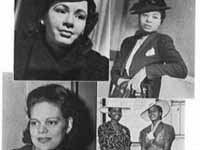
Highlights of Harlem, America's Great Black Center |
This intriguing portrait of one of the great centers of black
culture and creativity, entitled Harlem: Negro Metropolis, was
written during the high point of America's fascination with the
New York district. As Jamaican-born black author Claude McKay
suggests, not only creative artists, but imaginative and even
revolutionary thinkers swarmed to Harlem just prior to World War
II.
Harlem: Negro Metropolis, p.117
Claude McKay, Author
New York: E.P. Dutton and Co., 1940
General Collections (75)
|
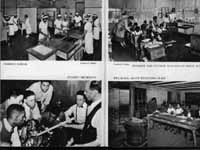
The Negro in Virginia Documents Black Contributions
|
The Negro in Virginia is one of the most thorough studies done on
American blacks by WPA writers during the 1930s and 1940s. Begun
under the auspices of the Federal Writers' Project, the book was
completed by the Virginia Project after the demise of the FWP in
1939. The book covers the whole history and contributions of
blacks in Virginia, from colonial times to 1940.
The Negro in Virginia, p. 260.
Federal Workers of the Writers' Program of Virginia, comp.
New York: Hastings House, 1940
General Collections (83)
|
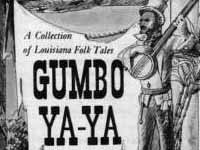
Gumbo Ya-Ya |
Creoles and Cajuns, Frenchmen and Spaniards, slaves, free-blacks,
Englishmen, and Indians, form the incredible social
"bouillabaisse" out of which the writers of the Louisiana WPA
extracted this collection of the fantastic folklore of bayou
country. Initiated under the auspices of the Federal Writers'
Project, Gumbo Ya-Ya was compiled by Lyle Saxon, State Director
of the Louisiana Project, and was richly illustrated by Caroline
Durifux and Roland Duevernet.
Gumbo Ya-Ya, title page
Compiled by the Louisiana Writers' Project
Boston: Houghton Mifflin, 1945
General Collections (84)
|
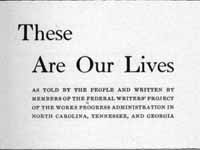
Oral Autobiographies of Farmers and Workers |
These Are Our Lives is a collection of thirty-five oral
autobiographies of black and white farmers and workers of the
South, recorded by Federal Writers' Project people in the states
of North Carolina, Tennessee, and Georgia. The idea of the
autobiographies, as expressed by their initiator, W.T. Couch, of
the North Carolina Project, was to "get life histories which are
readable and faithful representations of living persons, and
which . . . will give a fair picture of the structure of working
society."
These Are Our Lives, title page
Writers' Programs of North Carolina, Tennessee, and Georgia,
comp.
Chapel Hill: University of North Carolina, 1939
General Collections (85)
|
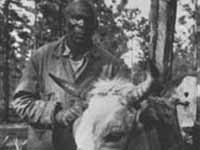
Living African Traditions in America |
The coastal regions of Georgia and South Carolina proved to be a
goldmine for the study of living African traditions in America.
In Drums and Shadows the Georgia Writers' Project chronicled the
tenacity of African artistic and linguistic traditions and their
influence on American culture.
Drums and Shadows:Survival Studies among the Georgia Coastal
Negroes, pl. XII
Georgia Writers' Project of the WPA, comp.
Athens: University of Georgia Press, 1940
General Collections (86) |






![[Previous]](prev.gif)
![[Next]](next.gif)
 Library of Congress
Library of Congress